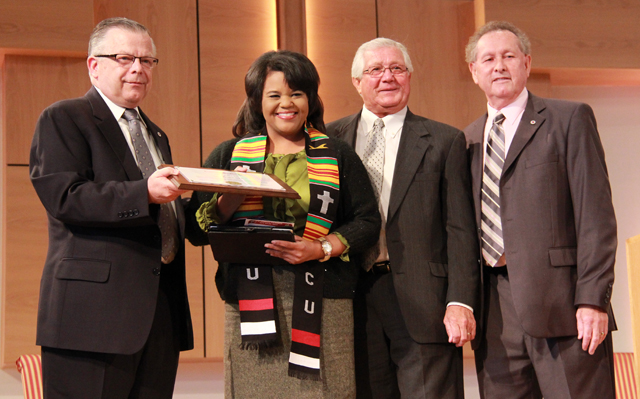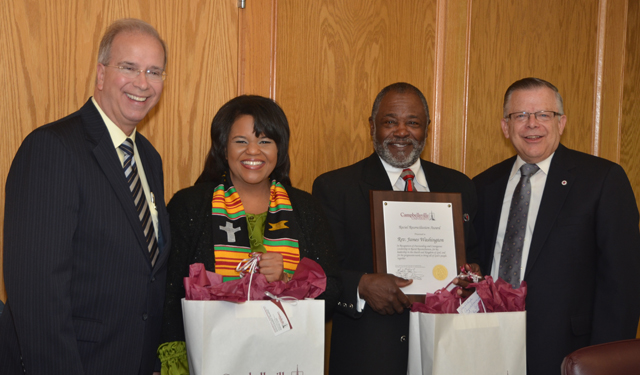Oct. 28, 2013
For Immediate Release
 |
| Renee Shaw, left, producer, writer and host of Kentucky Education Television’s “Connections with Renee Shaw,” receives the Kente Cloth from, from left: John Chowning, vice president for church and external relations and executive assistant to the president; Dr. Frank Cheatham, senior vice president for academic affairs; and Taylor County Judge/Executive Eddie Rogers. (Campbellsville University Photo by Rachel DeCoursey)
|
By Joan C. McKinney, news and publications coordinator
CAMPBELLSVILLE, Ky. — “It’s all about the love. If we get that part right, we’ll all be better off,” according to Renee Shaw.
Shaw, producer, writer and host of Kentucky Education Television’s “Connections with Renee Shaw,” a KET interview and discussion series that explores the cultures and concerns of Kentucky’s diverse minority communities and celebrates everyday heroes, was the guest speaker at Campbellsville University’s Dialogue on Race address Oct. 23 at chapel. This is the 15th year of the Dialogue on Race at CU.
She spoke of racism and challenges in everybody’s lives of dealing with civil rights and ways we can help defeat racism. Shaw defined racism as “really about fear of losing at least three things: power, privilege and political leverage.”
For her dedication to the cause of racial reconciliation across her community, through education and her faith, Shaw received Campbellsville University’s Kente Cloth, which is “bestowed upon outstanding individuals who have attained milestones in their lives.”
Dr. Frank Cheatham, senior vice president for academic affairs, and Taylor County Judge/Executive Eddie Rogers, along with John Chowning, vice president for church and external relations and executive assistant to the president, who was in charge of the ceremony, draped the cloth on her shoulders.
Chowning said the cloth is given to those who have “shown their worth to family, community and God … a servant leader.”
Shaw is one of a few recipients of the Kente Cloth given by CU. Its origins date back to 12th century Africa, in the country of Ghana. Kings, queens and important figures of state in Ghana’s society wore the cloth during ceremonial events and special occasions.
“Truly, it was a symbol of valor and honor,” Chowning said.
In her chapel address and in a luncheon in her honor following chapel, Shaw talked of “burying the hatchet, building a bridge and shining a light” as she quoted Dr. Robert Baker of Calvary Baptist Church in Lexington who delivered that message to her church First Baptist Church Bracktown in Lexington.
She talked of meeting with United States Congressman John Lewis (the only surviving speaker from the March on Washington 50 years ago) during which she took Baker’s words of “With faith, I will find patience and study the truth to work toward peace with love for reconciliation.” She said even in the midst of facing criticism and name calling, these freedoms are guaranteed and protected and enshrined in the United States Constitution, and “I thank God for it.”
“In the Bible of our government and democracy, are the rights of speech and belief guaranteed to those who seek to unify and those who seek to divide,” she said. “Racism may dwell among us, but it is our choice to let it not dwell within us,” she said.
Shaw, said she believes, like Lewis and the late Dr. Martin Luther King, in the “beloved community and transformative progress toward racial reconciliation. If I didn’t, I couldn’t do the work I do in good conscience.” She said, before she takes communion in her church, pastored by Dr. C.B. Atkins Sr., she urges herself “to be slow to take offense and to be always ready for reconciliation.”
She said we must “respect the dignity of humankind, not those we agree with or whose paths we understand, but every human being,” as Congressman Lewis said. “That’s how we undo racism,” she said. “What we have to believe is that we are light that curses the darkness. Those of us who believe in justice, peace and equality cannot, and will not, rest until it’s done.
“Our faith does not call us to be docile in adversity. Our faith arms us with everything we need to stand up against evil and wrong doers. “As Dr. King once said, ‘other-centered folks can build up what self-centered men chose to destroy,” she said.
Shaw said the dialogue on race starts with self-examination. “It’s asking ourselves what we don’t understand, seeking out friendships with folks who don’t share our block, zip code, bank account or church. “And it’s constantly remembering and practicing love and light that is slow to offense and quick to seek reconciliation,” she said.
She received a standing ovation for her address that Campbellsville University president Michael V. Carter called “one of the most outstanding in the history of chapel.” He called her words “brave and wonderful” and “needs to be said.”
 |
| Campbellsville University president Michael V. Carter, left, presents gifts to Renee Shaw and the Rev. James Washington, recipient of the Racial Reconciliation Award, presented by the Rev. John Chowning, vice president for church and external relations and executive assistant to the president. (Campbellsville University Photo by Joan C. McKinney)
|
At the luncheon in her honor, she thanked the university for the work, passion and dignity demonstrated in race relations at the university. Chowning said volunteerism is the key to helping eradicate racial problems, and he, with the support of Campbellsville University and Greater Campbellsville United, presented the Rev. James Washington, pastor of New Zion Baptist Church, with the Racial Reconciliation Award for his work with the university’s Dialogue on Race, a program begun over a decade ago, to discuss reconciliation, dialogue and civil discourse, and for Washington’s church and community work.
Chowning said the university’s Dialogue on Race is ongoing in October with about 200 students participating with 10 groups of study led by community and university leaders to facilitate discussion. He thanked the City of Campbellsville and Taylor County for their support of Greater Campbellsville United.
Carter said he isn’t aware of other programs that intentionally immerse racial dialogue with students like CU’s does.
Terry Allen, a native of Cumberland County who works as associate vice president for employment equity at the University of Kentucky, said CU’s Dialogue on Race is an “incredible event that starts with the use of CU’s mission and goals, strategic plan, etc.”
He said CU’s 25 percent diverse student population is “exceeds all reasonable expectations.”
CU has about 3,620 total head count enrollment this semester with about one out of four students as minorities. “We live in a global community of learners,” Carter said, “and we’re moving in that direction.”
Campbellsville University is a widely acclaimed Kentucky-based Christian university with more than 3,600 students offering 63 undergraduate options, 17 master’s degrees, five postgraduate areas and eight pre-professional programs. The website for complete information is campbellsville.edu.
